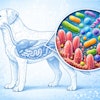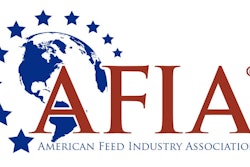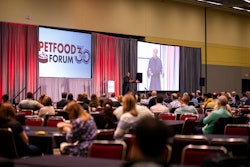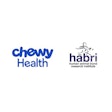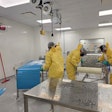Hill's Pet Nutrition, a global leader in science-led nutrition, and Harvard T.H. Chan School of Public Health researcher Dr. Curtis Huttenhower, are joining forces to create the One Health Microbiome Resource (OHMR).
Not only will the OHMR be the first of its kind, it will also be the largest and most comprehensive reference database of human and companion animal microbiomes, which provides unique opportunities to understand the health of both pets and pet owners.
"Because pets are members of the family, many consider their nutrition to be just as crucial as that of our human family members," said Dr. Huttenhower, professor of computational biology and bioinformatics at Harvard Chan School and co-director of the Harvard Chan Microbiome in Public Health Center. "The same can be said for their microbial communities. The OHMR provides a new way to improve both human and animal health through nutrition, better environmental exposures, and inter-individual resource sharing on a day-to-day basis. We believe improving a pet's microbiome positively impacts a pet parent's well-being and vice versa."
The OHMR include microbial genomes, companion animal microbial community profiles and tools to utilize them together. This is a key development for researchers, as microbiome research has become an increasingly important area of focus in maintaining health, as well as understanding diseases. This is in turn increasingly applicable to pet health specifically.
"We're excited to build on the foundation of human microbiome research to bring better nutrition and immune health to companion animals as well," said Dr. Huttenhower. "In the past decade, we've learned quite a bit about the human microbiome that can be applied to pets, and with the OHMR, we hope to expand this, and make the reverse true as well. Living with pets is already known to improve immune development in infants, and the OHMR will help us to understand how and why this occurs. Plus, it's especially important to build healthy, microbiome-aware diets for pets."
As part of the collaboration, Hill's Pet Nutrition has provided DNA sequencing resources that dwarf those previously included in the scientific literature, expanding them by a factor of almost five-fold. This data will enable entirely new types of companion animal microbiome analyses and further improve the field's ability to understand the microbiome in human health. With a 75-year history of using science to transform the lives of cats and dogs, Hill's has become a leader in the study of pet microbiome. Leveraging its world class global Pet Nutrition Center and advanced technology to understand the microbiome and how a pet's health can be positively impacted by nutrition.
"For more than a decade, Hill's has invested in pet microbiome research to explore and harness its benefits to improve pet health through nutrition," said Dave Baloga, executive vice president of science & technology at Hill's Pet Nutrition "We hope the formation of the One Health Microbiome Resource, together with Dr. Huttenhower at Harvard Chan School, will provide a platform for scientists to enhance the understanding of the microbiome's role in improving health, for both pets and humans. This reflects Hill's mission statement, which is to help enrich and lengthen the unique relationship between people and their pets."
The platform is expected to drive new research by providing resources, tools and data that represent both humans and companion animals, allowing the team to enhance the understanding of microbiome health in both pets and pet parents. The OHMR resources and data will be available to the entire scientific community for the advancement of microbiome research in humans, pets, and beyond.
"The OHMR will help bring renewed attention to and much needed data for the pet microbiome space, which traditionally has faced underrepresentation in terms of existing resources," said Baloga. "We're hopeful and excited to support more harmonized efforts to enable more generalized, reproducible results that will leverage the benefits of microbiome science for therapeutic purposes."

